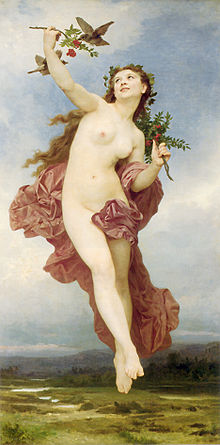Dies (mythology)
| Dies | |
|---|---|
Primordial goddess of the day | |
 Hemera/Dies (1881) by William-Adolphe Bouguereau | |
| Personal information | |
| Parents | Scotus and Nox |
| Siblings | Aether |
| Consort | Aether |
| Children | Caelus Thalassa Terra |
| Equivalents | |
| Greek equivalent | Hemera |
In Roman mythology Dies ("day") was the personification of day, and the Roman counterpart of the Greek goddess Hemera, the daughter of Nox (Night) and Scotus (Darkness).
She is the goddess of the daytime and, according to Hesiod, the daughter of Erebus and Nyx (the goddess of night).[1] Hemera is remarked upon in Cicero's De Natura Deorum, where it is logically determined that Dies (Hemera) must be a god, if Uranus is a god.[2] The poet Bacchylides states that Nyx and Chronos are the parents, but Hyginus in his preface to the Fabulae mentions Chaos as the mother/father and Nyx as her sister.
She was the female counterpart of her brother and consort, Aether (Light), but neither of them figured actively in myth or cult. Hyginus lists their children as Uranus, Gaia, and Thalassa (the primordial sea goddess), while Hesiod only lists Thalassa as their child.
